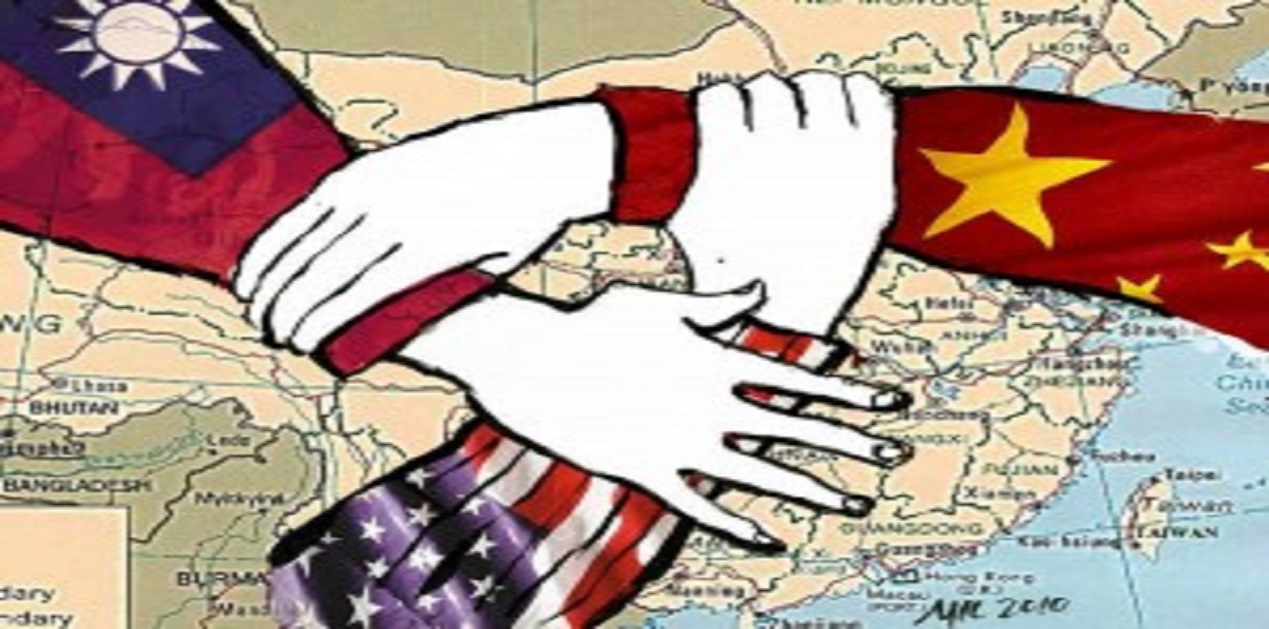Chinese approach towards Taiwan has becoming increasingly assertive since Tsai Ing-wen became the President of Taiwan in 2016. Her position on not accepting the 1992 consensus has not gone down well with Beijing. She has adopted a very ‘independent foreign policy’ for Taiwan and this has further complicated the relationship with Beijing.
On the other hand, relations between the United States and Taiwan have been getting very ‘warm’ under Tsai Ing-wen. It is no surprise that Washington has been allowing longer stays for her in the US despite Chinese protests. In August 2018 Tsai visited the NASA headquarters and in July 2019 she was allowed to stay on in New York for two extra days. Earlier the United States used to provide a few hours of stopover time to the Taiwanese Presidents.1 Later in July 2019, Tsai spent two days in Denver on her way back from Latin America. During this visit she discussed the idea of a Free Trade Pact with the state of Colorado.2
Taiwan has also been a major issue in the China-United States relations. In the words of Zhiqun Zhu, a professor of political science and international relations at Bucknell University, Taiwan will continue to be “chess piece” between Washington and Beijing and the more the relations get difficult the more Taipei will gain prominence.3 The United States decision to sell 66 F-16V jets to Taiwan worth 8 billion dollars to Taiwan has again ruffled Beijing. The Chinese side has expressed its discontent and argued that Washington should be prepared to face the consequences of this sale as Beijing is ready to do anything to protect its selfinterest. It is believed that these jets will strengthen Taipei’s defence against Chinese air strikes.4
However, Beijing has worked towards reducing the diplomatic space of Taiwan. In the last four years Beijing has used its economic leverage in getting countries to shift their diplomatic relations. In the last four years the number of countries which has had diplomatic relations with Taiwan has reduced to just 17. Countries like El Salvador, Burkina Faso, Dominican Republic and Vatican have shifted their recognition to China.5 This will be a major diplomatic challenge for Taiwan in the future. In May 2019 US acting assistant secretary for Southeast Asia W. Patrick Murphy had requested the Pacific Island countries to not switch their diplomatic relations.6 Though Taipei has been continuously asserting its democratic identity, the attraction of Chinese money and investments has been too strong for the smaller nations to resist.
In order to express its stand towards Taiwan the Chinese government discussed it in its recently released Defence White Paper on July 24, 2019. From time to time the Chinese government issues white papers on a number of issues which help in understanding the direction and aims of its policies. In line with the Xi Jinping’s policies and goals, the recent white paper is titled ‘China's National Defense in the New Era’. This is the 10th Defence White Paper and the first detailed one since the 18th Party Congress of 2012. The paper consists of six major sections; “the international security situation, China's defensive national defense policy in the new era, fulfilling the missions and tasks of China's armed forces in the new era, reform in China's national defense and armed forces, reasonable and appropriate defense expenditure, and actively contributing to building a community with a shared future for mankind”.7
The Paper attempts to counter the growing Chinese expansionism talks with the focus on China’s peaceful development and non-hegemonic agenda. However, when it comes to Taiwan the Chinese government’s position and stance remains aggressive. The paper blames the Democratic People’s Party (DPP) and its agenda for pushing for Taiwanese independence and hurting the China-Taiwan relations. The paper argues, “They [DPP] have gone further down the path of separatism by stepping up efforts to sever the connection with the mainland in favor of gradual independence, pushing for de jure independence, intensifying hostility and confrontation, and borrowing the strength of foreign influence”.8 This is in line with Xi’s stand that, “China will not give up even an inch of its territory”. He had made this statement during the visit of US Defence Secretary James Mattis in June 2018.9
In addition, Beijing has also been blaming Taipei for being ‘complicit’ towards the ongoing protests in Hong Kong. As a response to this Taiwan has claimed that it has never been part of the ‘one country, two systems’. In order to clear its stand the Taiwan’s Mainland Affairs Office said that “The Chinese Communist Party should admit its mistakes and start political reforms, practise democracy and respect human rights. And only afterwards can Beijing solve its internal and external crisis”.10 Such statements make it clear that it has an independent approach towards the ongoing developments and it does not subscribe to the Chinese view and it is also not ready to accept the ‘one country, two systems’ formula.
Tsai Ing-wen has won the nomination from the DPP as the candidate for the 2020 Presidential elections.11 Tsai and Xi have shared a very difficult relationship and the cross-straits relations have been at its lowest. If Tsai wins the upcoming elections in January 2020 it may further complicate this relationship. How the China, United States and Taiwan maneuver through the changes will decide the status of peace and stability in the Taiwan Straits. All the three actors have been quite active and have tried to influence the developments in the region.
References
- “In a snub to China, the U.S. lets Taiwan’s president spend some time in New York” By Ralph Jennings, Los Angeles Times, July 11, 2019 at https://www.latimes.com/world/asia/la-fg-taiwan-us-stopover-20190711-story.html, (accessed August 22, 2019).
- “Taiwan President Tsai Ing-wen discusses free trade pact with Colorado” The Standard, July 22, 2019 at http://www.thestandard.com.hk/breaking-news.php?id=131727&sid=2, (accessed August 22, 2019).
- “As US-China relations sour, Taiwan’s value as a ‘chess piece’ may rise” by Shirley Tay, CNBC, June 11, 2019 at https://www.cnbc.com/2019/06/11/as-us-china-relations-sour-taiwans-value-as-a-chess-piece-may-rise.html, (accessed August 22, 2019).
- “Beijing warns US of ‘consequences’ after Donald Trump approves US$8 billion sale of fighter jets to Taiwan” by Lawrence Chung, South China Morning Post, August 19, 2019 at https://www.scmp.com/news/china/military/article/3023387/donald-trump-confirms-he-has-approved-us8-billion-deal-sell, (accessed August 22, 2019).
- “Taiwan shifts gears as China poaches diplomatic allies” by
Kathrin Hille, Financial Times, October 10, 2018, at https://www.ft.com/content/5187cf44-c513-11e8-8670-c5353379f7c2, (accessed September 5, 2019). - “US official urges Pacific island nations to maintain diplomatic ties with Taiwan” South China Morning Post, May 24, 2019 at https://www.scmp.com/news/china/diplomacy/article/3011643/us-official-urges-pacific-island-nations-maintain-diplomatic, (accessed September 5, 2019).
- “China issues white paper on national defense in new era” Xinhua, July 24, 2019 at http://www.xinhuanet.com/english/2019-07/24/c_138253180.htm, (accessed July 25, 2019).
- “Full Text: China's National Defense in the New Era” Xinhua, July 24, 2019 at http://www.xinhuanet.com/english/2019-07/24/c_138253389.htm, (accessed July 25, 2019).
- “China won't give up 'one inch' of territory says President Xi to Mattis” BBC, June 28, 2018 at https://www.bbc.com/news/world-asia-china-44638817, (accessed September 5, 2019).
- “Taiwan hits out at Beijing after claim it is involved in Hong Kong protests” by Kristin Huang, South China Morning Post, September 1, 2019 at https://www.scmp.com/news/china/politics/article/3025279/taiwan-hits-out-beijing-after-claim-it-involved-hong-kong, (accessed September 5, 2019).
- “Taiwanese president reportedly wins ruling party’s nomination for 2020 election” CNBC, June 13, 2019 at https://www.cnbc.com/2019/06/13/taiwan-president-tsai-ing-wen-wins-nomination-for-2020-election-media.html, (accessed September 5, 2019).
(The paper is the author’s individual scholastic articulation. The author certifies that the article/paper is original in content, unpublished and it has not been submitted for publication/web upload elsewhere, and that the facts and figures quoted are duly referenced, as needed, and are believed to be correct). (The paper does not necessarily represent the organisational stance... More >>
Image Source: https://www.uscnpm.org/blog/2016/01/12/11636/










Post new comment